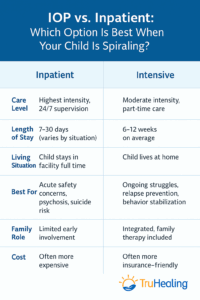When your child is spiraling, it doesn’t feel like a parenting moment—it feels like a crisis. One day they’re skipping school, barely talking, or maybe using drugs. The next, you’re wondering if they need to be hospitalized. The fear is constant. The guilt? Unrelenting. And the decisions? They feel impossibly high-stakes.
As a parent, it’s normal to freeze when you’re faced with unfamiliar terms like “inpatient care” or “intensive outpatient program.” What do they really mean? How do you know which one is right?
This guide is here to give you clarity—not more pressure. Let’s walk through what each level of care offers, when they’re appropriate, and how you can get the right support here in Cincinnati.
What Is Inpatient Treatment?
Inpatient treatment, sometimes referred to as “residential” or “hospital-based care,” is the highest level of behavioral health support. It’s designed for young people in acute crisis—when safety is uncertain or psychiatric symptoms are severe.
What inpatient care includes:
- 24/7 supervision by medical and clinical staff
- Crisis stabilization and medication management
- Structured therapeutic schedule with multiple daily sessions
- Removal from home, school, and peers to reduce environmental triggers
- A safe, controlled space with round-the-clock observation
Inpatient care is not forever. It’s a short-term solution, usually lasting a few days to a few weeks, depending on the situation. The goal is to stabilize—not to “fix everything” in one stay.
What Is an Intensive Outpatient Program (IOP)?
An Intensive Outpatient Program (IOP) is a step below inpatient in intensity but still offers more support than weekly therapy. It’s structured, immersive, and designed for kids who need help managing mental health or substance use—but who can still live at home safely.
What IOP includes:
- Group therapy 3–5 days per week
- Individual and family therapy
- Drug screening and psychiatric support when appropriate
- After-school or daytime scheduling options
- Collaborative care that includes parents and schools when needed
At TruHealing Cincinnati, our IOP helps teens get the help they need without having to leave their lives behind.
Inpatient vs. IOP: A Side-by-Side Comparison
| Feature | Inpatient Treatment | Intensive Outpatient Program |
|---|---|---|
| Care Level | Highest intensity, 24/7 supervision | Moderate intensity, part-time care |
| Length of Stay | 7–30 days (varies by situation) | 6–12 weeks on average |
| Living Situation | Child stays in facility full time | Child lives at home |
| Best For | Acute safety concerns, psychosis, suicide risk | Ongoing struggles, relapse prevention, behavior stabilization |
| Family Role | Limited early involvement | Integrated, family therapy included |
| Environment | Highly structured, no outside contact | Child remains engaged with daily life |
| Cost | Often more expensive | Often more insurance-friendly |
How to Tell What Your Child Needs
It’s one of the most terrifying questions a parent can face: Is my child safe at home?
That’s the first place to start.
Inpatient may be necessary if:
- Your child is expressing suicidal thoughts or has a plan
- They’ve experienced a recent psychiatric break or severe emotional outburst
- They cannot function at home or school and are at risk of harming themselves or others
- Substance use is dangerously out of control
IOP may be a better fit if:
- Your child has begun showing behavioral changes or emotional shifts that concern you
- There’s been an increase in defiance, depression, isolation, or school refusal—but not a full crisis
- Weekly therapy isn’t enough, and they need more frequent support
- You’re looking for structured care that involves the whole family without removing your child from home
Sometimes it’s not black and white. That’s okay. The team at TruHealing Cincinnati offers assessments that help families understand where their child fits best. And we don’t pressure—our only goal is to make sure your child is safe and supported.
Why This Choice Feels So Heavy
Choosing a level of care isn’t just about logistics—it’s about fear. It’s about standing in the middle of a storm and trying to find a lifeline. It’s about feeling like everything you’ve done hasn’t worked and wondering if it’s too late.
You haven’t failed. You’re not supposed to know everything. And there is help—real help, grounded help—that can meet your family where you are.
Inpatient and IOP aren’t opposites. They’re part of a care continuum. One isn’t better than the other—they’re just different tools for different levels of need.
Getting Support in Cincinnati
At TruHealing Cincinnati, we work with families at every stage of crisis and recovery. Our Intensive Outpatient Program serves local teens and young adults who are struggling—but still reachable.
We believe in your child’s capacity for change. We believe in family-based healing. And we believe in giving you clear, calm guidance—especially when things feel out of control.
To learn more about what we offer, visit our Cincinnati substance abuse treatment page. You’ll find more about IOP, partial hospitalization, and how we tailor care to your family’s needs.
Frequently Asked Questions
How do I know if my child is safe at home?
If your child has expressed suicidal thoughts, harmed themselves, or you feel they are a danger to themselves or others, inpatient care is likely appropriate. When in doubt, contact a professional for an assessment or call emergency services.
Can my child attend school while in an IOP?
Yes. Many IOPs, including ours at TruHealing Cincinnati, offer after-school scheduling. This allows your child to continue attending school while receiving intensive treatment.
Is inpatient care always required before starting IOP?
Not necessarily. Some teens begin in IOP if their symptoms don’t require 24/7 supervision. In other cases, IOP is used as a step-down after inpatient care.
What if my child refuses to go?
It’s common for teens to resist treatment, especially if they feel embarrassed, ashamed, or misunderstood. Our team can support you in navigating this conversation with empathy and clarity—and we often speak directly with teens to help ease their fear.
Will insurance cover inpatient or IOP?
Most insurance plans cover both levels of care to some extent. TruHealing Cincinnati can help you verify your benefits and understand your options—without obligation.
Ready to Talk?
You don’t have to figure this out alone.
📞 Call TruHealing Cincinnati at (513) 643-9117. We’ll walk you through what makes sense for your child—one step, one option, one calm conversation at a time.


